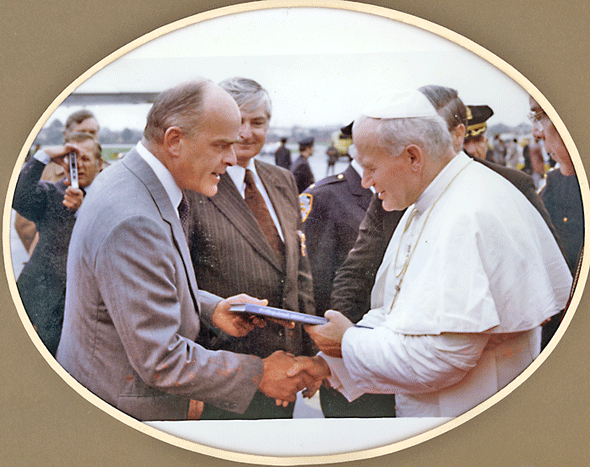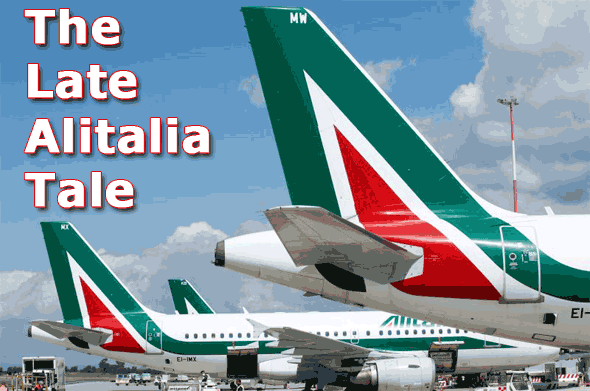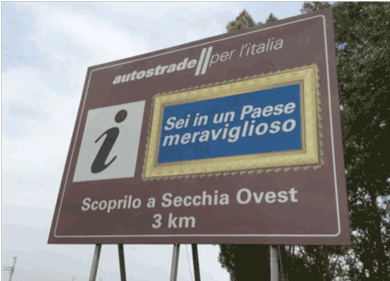 |
As some of us know and those who follow
the fortunes of airlines a bit closer surely read in the last few days,
Alitalia has formally dismissed almost 100% of its remaining staff. These
women and men were officially still on Alitalia’s payroll, but had
been paid with funds appropriately allocated for this purpose in the absence
of AZ operations.
In this happenstance I thought to share
a short story in the history of Alitalia written by Marco Sorgetti, which
combines just too well with some memories of mine.
AZ served to provide the Papal Airplane
Shepherd One for The Pope on his world visits. When Pope John Paul II
visited the USA in October 1979, he landed in Washington D.C. and then
TWA flew him to many cities, where he took the country by storm. When
he arrived in New York at La Guardia’s Marine
Air Terminal to address the United Nations and visit the City, they
rolled out the red carpet as dignitaries including Catholic Cardinals
and local politicians greeted the Apostolic journey.
We had just saved The Marine Air Terminal
from extinction and were in the process of having it declared a Landmark,
a first at any airport in North America. George Leighton “Tim”
Peirce, then General Manager, greeted the Holy Father and presented him
with a book I had written and published on the 40th Anniversary of La
Guardia Airport in 1979, which included details of how the Marine Air
Terminal was saved and especially its giant Mural “Flight”,
on the upper walls of the lobby of the building, painted by James
Brooks in 1942.
That moment was captured in this photograph
with Tim and Pope John Paul II and, in an unusual turn of fate, my name
Geoffrey Arend and the title of the book Great Airports, La Guardia, are
clearly visible in the picture.
When I saw this scene play out live on local
television as it happened, I fell off my chair. Later, when I learned
somebody got the picture and was asked about it, I said: “Thrilled
and honored to think I know of two books that The Pontiff has read for
sure”. Joking apart, I thought to include this with a picture of
“Shepherd One”. Please forgive my utterance, but when I think
of Alitalia, Italy and Rome and what it means in the world, I am unable
to forget this lasting experience of seeing the Pope with my book in his
arms . . . There have been books about that experience over the years,
but this thing cannot get out of my head and as soon as I read Marco’s
article below it all came back to my head as déjà-vu.
This following is Marco Sorgetti’s
article including his thoughts on Alitalia’s experience and other
events taking place in Rome, some exquisite and others with something
left to aspiration. Marco takes over now with a story that will be divided
in two parts, the first mainly on Alitalia and the second mainly on Italian
trade and logistics, past and present.
 |
 |
This is not only an article about the rise
and fall of Alitalia,
the Italian phoenix flying in the second half of the twentieth century.
I shall also try to present a picture of Italy at work in the air, on
the ground and underground: Inferno, Purgatory and Paradise, as my country
actually appears to many. It is not the first time that I write about
AZ and perhaps not the last one, depending on who will ever dare use their
brand again. Some derided Alitalia as an uncanny acronym with a sinister
meaning when we were young apprentices in the air cargo business: Always
Late In Take-off Always Late In Arrival. In reality AZ’s service
was often more than decent, but Italians can be hard to please and Alitalia’s
services were often appreciated more abroad than at home.
The roller-coaster story that here follows
was occasioned by a conversation with Geoffrey and this was his suggestion:
“Had a good friend named Marco Marchetti, who guided the fortunes
of Alitalia Cargo in USA during the 1980’s. Marco served during
that era when the best foreign flag carriers maintained headquarters and
a showcase ticket office on Fifth Avenue in Manhattan. Across the street
was the Japan Airlines Building and just nearby was Tiffany’s. At
666 Fifth Ave. where Alitalia was emblazoned in a branding sign and behind
a plate glass window, ground level was the Alitalia ticket office and
upstairs were the offices and reservation centre. Writing this and thinking
about those times brings back memories of a great and wonderful time I
had not thought about much with a twinge of melancholy. ‘Top of
the Sixes’, a legendary restaurant, was a favourite watering hole
for us then. That’s where I met with Buz Whalen, VP JAL Cargo and
Marco and we talked about the reforming of TIACA, as their original organisation
operated by Society of Automotive Engineers (SAE) had elected to give
the then IACA (TIACA minus the T) up. But what fun, and what am left with
in 2023 is no sadness, but a yearning for some story once in a while of
Italian logistics, forwarding, airline/airport cargo. Maybe you might
share some thoughts and news?”
I hope the account following will not disappoint
you, but let me tell you: today we are distanced from Tiffany’s
by many leagues. I have to begin from afar. For you to understand my spirit
in this, you need to embrace and understand the splendour and misery that
so often appear side by side in my country. I am sitting here at home
listening to the dire news on the radio, split between atrocity in the
Middle East and atrocity at home, where the umpteenth murder has been
perpetrated against a young lady by her fiancé near Venice. He
was captured while legging it in Germany and was extradited to face trial
in Italy. Much of the discussion on TV, radio and social media unwittingly
contributes to absorbing the monstrous content of his act within the boundaries
of the extraordinary.
Extraordinary my foot! Day in day out we
have the same news: another woman has been assaulted and killed. It has
become sadly ordinary and it is so horrific that one would prefer to switch
off. What is causing this nightmare? Why has my country become so barbaric?
In reality, if you look at European statistics, Italy, Spain and Greece
come last in this atrocious list and are therefore better off than others;
still, is this of any comfort if you read such stories?
You will argue that this has nothing to
do with Alitalia and logistics, but there is a thread that I am trying
to uncover, if you have the patience to follow me for a little while.
I am writing in dismay, in the middle of this sad and miserable news,
curiously on the very day JFK was killed 60 years ago, another reason
for weeping . . . It was a terrible day for the kid I was in 1963, my
innocent hopes of a wonderful future for the whole world had been shattered.
Probably mine was just a boy’s dream pumped up by propaganda, but
it was hard for an 11-year-old Italian, who believed Kennedy’s America
would make the world a better place for everybody, after all the suffering,
death and destruction we had heard from our parents talking about WW II.
All of a sudden America was falling from the pinnacle and that bitter
truth came with the sudden, wretched death toll of its own President.
So what was Italy in 1963 instead? How could
Italy go from the rags of 1945 to maintaining the luxury of a posh sales
office in Manhattan in 1980 for its flagship airline?
 If you arrive from abroad, driving on one of our (today) torn motorways,
sooner or later you will see a big road sign that tells you in Italian:
“You are in a wonderful country”. This is a campaign that
was started when our governors decided that travellers actually had to
be told on arrival. Many governments before that, this idea was considered
fait-accompli and nobody felt it necessary to make any statement about
it. The country was actually wonderful, period. You could drive into Italy
undisturbed and find out for yourself. What about today?
If you arrive from abroad, driving on one of our (today) torn motorways,
sooner or later you will see a big road sign that tells you in Italian:
“You are in a wonderful country”. This is a campaign that
was started when our governors decided that travellers actually had to
be told on arrival. Many governments before that, this idea was considered
fait-accompli and nobody felt it necessary to make any statement about
it. The country was actually wonderful, period. You could drive into Italy
undisturbed and find out for yourself. What about today?
Many people consider Italy a wonderful country
and indeed it contains an outstanding amount of marvels. It also contains
an outstanding amount of vice and such evil is creeping into the most
obscure and unexplored areas of our souls. If you read Dante’s
Inferno, you will understand that many of the traits so handsomely
drawn up by the 13th century Italian Bard still linger in modern Italy.
Perhaps it is not so different in other parts
of the world, but in here it is particularly evident and it strikes for
its present day’s pervasiveness. Much there is to argue about this
point, but the country was so different may years ago that you cannot
recognise it any more. Maybe Italy in 1950, 1960 and 1970 was an exception,
but that is the time we are talking about, when we recap the development
of Alitalia in the middle of the then fast growing Italian economy. Let
us take Turin, an easy example for me. It is not the whole of Italy, but
it has a special place indeed, as it contributed to Italy’s destiny
in a pretty conspicuous manner.
Turin, where I was born in 1952 and grew
up, is a fairly charming city today. It was then a polluted, unhealthy,
chaotic place, which drove and symbolised the “Italian economic
miracle” as Italians call the flamboyant progress, which took place
after WW II. Its art and refinement, which attract tourists today, were
confined to the back burner in those grey days. Turin was Italy’s
first capital, after being the capital of the small, but tenacious kingdom
of Piedmont
and Sardinia, ruled by the dynasty of Savoy.
Soon losing the race for capital to Rome after the reunification of the
country in 1861, Turin was transformed into an industrial powerhouse and
flourished for many years, albeit in a different skin, at the end of 19th
Century and beyond. Art
Nouveau was renovating the face of the city, which had also become
one of the capitals of cinema: Cabiria,
the first film to be shown at the White House in Washington, was produced
and shot in Turin. In 1911 our municipality built the largest sport stadium
in the world, which was used until 1938 and dismantled in 1946; now the
same plot contains inter alia one of the best engineering universities
in Europe, the Politecnico
of Turin, where so many glorious engineers and architects started
their fortunes.
A bit closer in time, in the 1950’s,
that was actually the time when our flagship airline ALITALIA was moving
its first steps abroad and was preparing for its real international debut,
which came with the 1960 Olympic Games in Rome. Between 1960 and 1980
all that one could think of was produced and forged in Italy, in particular
within the boundaries of Turin’s region, Piedmont.
Before the globalisation, Turin and its surroundings produced nearly everything
industry could ever comprise: cars, typewriters, calculators, telephones,
pens, chemicals, textiles, buttons, TV sets, suits, gowns, Superga
shoes, textiles and yarn, any kind of plastic, curtains made of “Terital”,
an innovative fabric that was both light and discreet. You just pick anything
industrial produced sixty years ago, well, Turin was within reach
. . . Piaggio was producing the Vespa
in Finale Ligure, which is not in Piedmont, yet less than 100 miles away,
but then again Olivetti
had even produced the first personal computer in Ivrea,
long before Apple Inc. started its Mac. Let’s face it: Olivetti
no longer exists as a computer company, and Apple is one of the most successful
businesses in the world, but it is difficult to argue with Apple’s
numbers, it is a question of proportions. In those years you could say
Olivetti was pretty big, though.
Unsurprisingly there was a lot of cargo
flying from Turin, and many airlines serviced our small airport directly,
at least for freight, however most of the stuff was being exported by
truck or train. As a young freight forwarder I remember I was pretty surprised
that I could ship an entire truckload of “lever arch mechanisms”
to London! Sending entire truckloads of Divisumma and Editor machines
from Olivetti was considered normal, but one truckload a week of lever
arch mechanisms from the nearby Barbania Canavese was testing the boundaries
of my wildest imagination as a forwarder. Barbania Canavese was probably
the closest you can get to the idea of “the
most interesting man in Dorking”, with all due respect for the
locals in both regions. Yet these guys invaded the world with their lever
arch mechanisms in that period, all this without hitting the news even
once. It was a different world indeed.
Those were the days of FIAT
and Lancia
cars, wonderful textiles from Biella, Nutella,
Lavazza
coffee, Aurora
pens . . . and asbestos, alas. In 2023 some of this industry is preserved
and some had gone with the rigours of globalisation, other ones, more
dangerous, with the dawning of a more considered production, fortunately.
The powerful engine behind Turin’s wild enterprising spirit in those
years is surely gone for good and that is a pity in my view. This part
of the country was progressively smothered by politicians’ choices
made after the first oil
crisis. We shall see in the second part how the stifling embrace of
Italian politics can extinguish any kind of enterprising spirit in this
part of the Mediterranean.
Something still burns though, not long ago
we apprehended that one of the largest Italian enterprises, MSC,
which actually is based in Geneva, CH is tying an agreement with Ferrovie
dello Stato, or what is left of it after privatisation. This is more
or less what is boiling in the pot: the two behemoths are joining forces.
The Italian railways and MSC agreed to share efforts to develop intermodal
terminals. The aim is to expand the freight network from the Italian ports
to the rest of Europe. This is the main objective of the memorandum of
understanding that was signed (source www.fsitaliane.it)
by the high level representatives a few weeks ago.
In my view this is a very important step
forward and shows Italy still has something to say in global trade. We
shall soon see whether the resurrecting Italian entrepreneur will be able
to decoy the oppression of Italian politics . . . There is more movement
around us than we were expecting and this is really good. A promising
sight was unwittingly close to me on debarking from my train from Rome.
I saw the former RAI
skyscraper in centre of Turin surrounded by newly erected scaffolds
and workers actually occupied on site. The building had been deserted
for some thirty odd years, as its structure contained asbestos to an extent
that discouraged conversion. Returning life to this glorious office of
the state-owned Italian
Radio and Television, initiated as many other innovations within walking
distance from the Mole
Antonelliana, is a breath of fresh air for our life in Turin. After
walking in front of this abandoned, dusty, rotting skyscraper for the
last few decades with discomfort, it is breath-taking to see work being
done now, whatever they have in mind for its future. Anything is better
than a slow, cruel death by exhaustion.

Alitalia may have flown its final flight
in October 2021, but in Rome faced with seeing their ranks decimated
by the “new” Italian airline ITA, some AZ employees stripped
off their old uniforms in opposition to the takeover.
"We are here to express first of all
our pain and also the solidarity for all our colleagues who were forced
to sign a humiliating contract," said Cristina Poggesi, one of
many flight attendants who protested in Rome. Standing in rows atop
Capitoline Hill, the women lowered their shoulder bags to the cobblestone
pavement, before slowly removing their jackets, skirts, and high-heeled
shoes.
Wearing only their undergarments, they shouted, "We are Alitalia!"
in unison. |
Here we come back to the ALITALIA
tale and brand in today’s landscape. Who owns Alitalia now? That
is an interesting question from some points of view. One could argue that
with all the money that Italians have thrown into this flying exercise
since 1946, ALITALIA should be owned by the Italian people. Not quite.
They did spend the money, but they received little in return. What is
even more controversial is that even those who appeared to have benefited
from the legacy, in reality did not, as most of the names involved in
those transactions and negotiations died or were wiped out from the stage,
not that their fame was remarkable abroad at any given time. So what is
of Alitalia today? The company ceased to operate as an airline in 2021,
after a long and expensive agony. In reality it is difficult to find a
period when Alitalia could be considered a thriving company, but there
was a time when it provided very distinctive service, in particular across
the Atlantic and that coincides with Geoffrey’s recollections. The
operations remaining in 2021 were collected by ITA Airways and will probably
end up in Lufthansa’s big nest in due time, once and for all. The
brand Alitalia remained in the hands of the Italian state, and was then
sold to ITA Airways for the alleged sum of 90 million Euros and is being
kept idle at this point. There are rumours that the sale was worth “one
Euro”, but we shall not get there . . .
In the meantime, a negotiation with Lufthansa
is supposed to finally privatise what remains of the former glory under
the ITA Airways brand. I expect sooner or later Alitalia will come back
and fly in the air. This is no more than my own speculation and there
is nothing supporting my assumption, so you should read it as an expression
of my fantasy, but Alitalia is a phoenix in my view and I am sure it will
resurrect soon. We have a right wing government, which appears destined
to resist for five years or more: some of these politicians will want
to contemplate their success mirrored in the resurrection of the phoenix
to make Italians dream of flying in luxury again with Alitalia . . . This
project has not been pronounced yet, but I am sure it is lurking somewhere
and will be thrown onto the local political debate as soon as the opportunity
arises. In my calculations this will happen in about two years. I hope
we are all there in good health to see if I was right or wrong. As I said,
this is pure speculation and there is no supporting material for this
credo.
In any case the position of FCO
in the middle of the Mediterranean is quite unique, to the point of making
it interesting for competitors to use any kind of influence to contain
its expansion. Any kind of influence means of course approaching Italian
politics closer and closer. That is the moot point, which has determined
the success and failure of many initiatives in this country, including
Alitalia, for many, many years. There are endless examples: one for all,
in fact quite close to me as I am from Turin: FIAT (the acronym, Fabbrica
Italiana Automobili Torino, means Italian Car Factory in Turin . . . ).
When FIAT encountered politics in Rome with a view to averting international
competition within our country, it signed its own kiss of death in my
view. The once flourishing company, which even managed to buy Chrysler
as an extreme somersault, is eventually exiting Italy and Turin on its
tiptoes at this point of history, when it is no longer the Agnelli
family’s pride and joy.
The delusion that politics can help industrialists
attain their goals is just what it is: delusion. The only thing that keeps
industry awake is competition: if you try to sidestep competition, sooner
or later complacency takes control and your flourishing business starts
withering. Worse if you have a political debt to repay. In Italy I have
seen this happening so many times I cannot tell any more.
At this point we come to the entr’acte.
There will be more about Italy and its logistics and political landscape
in the following part of this article, which the FlyingTypers
will publish soon. My very best wishes to all our readers for a successful
2024.
Marco L. Sorgetti |





 Vol.
22 No. 43
Vol.
22 No. 43 Vol.
22 No. 44
Vol.
22 No. 44